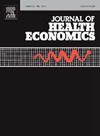对责任敏感的健康福利权重
IF 3.6
2区 经济学
Q1 ECONOMICS
引用次数: 0
摘要
我们估计健康的福利权重,以促进项目评估,允许通过三个非健康特征来规避健康不平等和健康不平等。在英国的一个普通人群样本中,569名在线实验参与者分配了有限的资源,以确定按随机生成的资源生产率、性别、收入和吸烟情况区分的假设个体的健康状况(41,460个观察值)。我们引出了关于收入和吸烟的责任的信念,并利用它们与分配的关联来估计这两个特征对健康的责任敏感权重。我们发现女性健康的优先级较低,较贫穷个人的健康的优先级较低,非吸烟者的健康优先级高于吸烟者。对健康不平等的严重厌恶降低了健康有利的女性和不吸烟者的体重,并增加了健康不利的穷人的体重。随着对收入和吸烟责任的信念的加强,穷人的权重降低,而不吸烟者的权重显著增加。本文章由计算机程序翻译,如有差异,请以英文原文为准。
Responsibility-sensitive welfare weights for health
We estimate welfare weights for health to facilitate program evaluation allowing for aversion to health inequality and to health inequity by three non-health characteristics. In a UK general population sample, 569 online experiment participants distribute constrained resources to determine the health of hypothetical individuals distinguished by randomly generated resource productivity as well as sex, income and smoking (41,460 observations). We elicit beliefs about responsibility for income and smoking, and use their associations with the allocations to estimate responsibility-sensitive weights for health by those two characteristics. We find weak prioritisation of females’ health, moderate prioritisation of the health of poorer individuals and strong prioritisation of the health of non-smokers over that of smokers. Substantial aversion to health inequality lowers weights on females and non-smokers, who are health-advantaged, and raises the weight on the poor, who are health-disadvantaged. As beliefs about responsibility for income and smoking strengthen, weights on the poor decrease and weights on non-smokers significantly increase.
求助全文
通过发布文献求助,成功后即可免费获取论文全文。
去求助
来源期刊

Journal of Health Economics
医学-卫生保健
CiteScore
6.10
自引率
2.90%
发文量
96
审稿时长
49 days
期刊介绍:
This journal seeks articles related to the economics of health and medical care. Its scope will include the following topics:
Production and supply of health services;
Demand and utilization of health services;
Financing of health services;
Determinants of health, including investments in health and risky health behaviors;
Economic consequences of ill-health;
Behavioral models of demanders, suppliers and other health care agencies;
Evaluation of policy interventions that yield economic insights;
Efficiency and distributional aspects of health policy;
and such other topics as the Editors may deem appropriate.
 求助内容:
求助内容: 应助结果提醒方式:
应助结果提醒方式:


